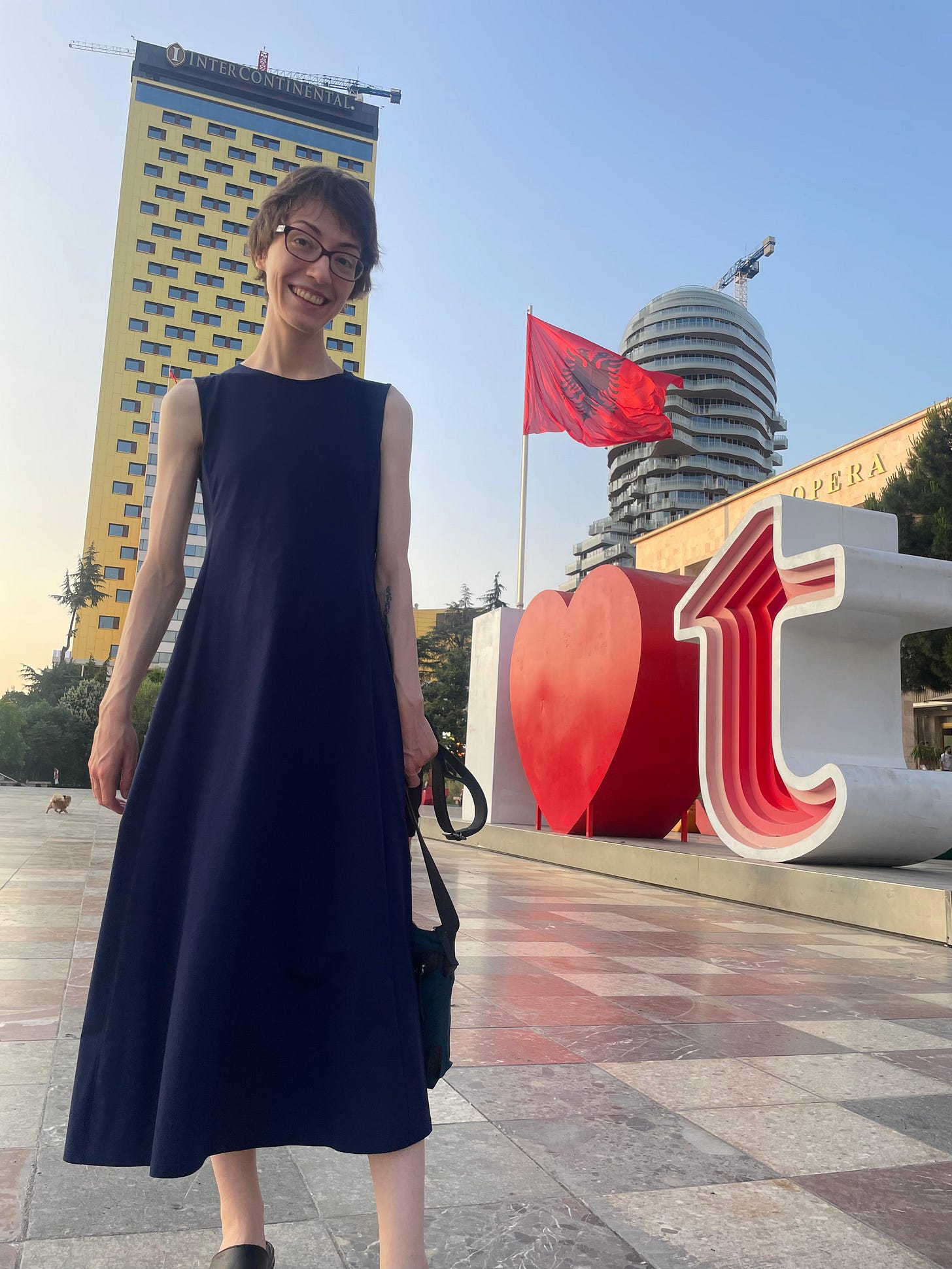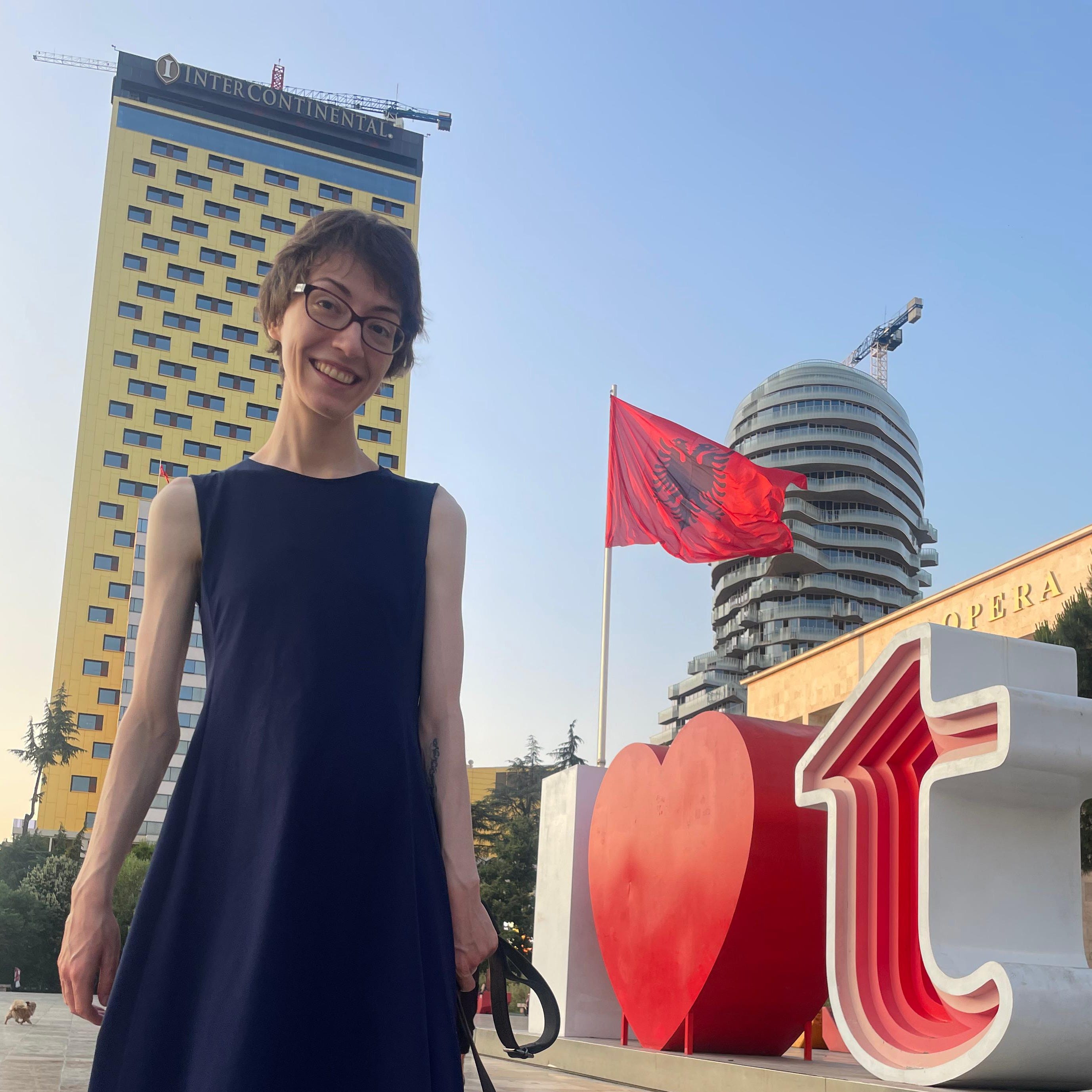Should You Move to Albania?
Insights and reflections from people who've done it: Tirana edition
I bet you didn’t have this one on your bingo card! In the next instalment of the ‘Should You Move’ series, we head to a country that few people consider when thinking about moving abroad: Albania.
Rebecca Kulik, from the newly minted Substack, Reading in Unusual Places, has travelled and lived around the world, but what was it about Albania that made her stay?
Let’s find out!
Rebecca Kulik
1. Background:
Country of origin: United States
Country of current residence: Albania
Length of time living abroad: 11 years (wow)
2. Motivation:
In my senior year of college, I got a grant to teach for a year in Indonesia. Then, I did 2 years with the Peace Corps in China. I didn't want to move back yet, so I got teaching jobs at schools in Thailand. When the last of those ended, I turned into a digital nomad, and I wanted to move to Europe, so I just did!
What was the primary reason for your move? (e.g., work, study, retirement, lifestyle):
It was really all lifestyle. I studied abroad in college and found that I liked living abroad even more than travelling abroad — it's just such a different way of experiencing a culture. Though I still travel plenty when I can!
3. Practicalities: How challenging was the visa and work permit process?
This is completely different in each country, of course. Where I am currently in Albania, it was actually easier than anywhere before because I splurged on a good lawyer. Albania's fantastic for Americans because we're eligible for a 5-year residency, and I got it without much hassle. A work permit was required before residency, but my lawyer and accountant handled most of the paperwork.
What were the biggest hurdles in setting up your life abroad (e.g., housing, healthcare, banking)?
I've found that the trickiest thing is always problems like "what to do if your refrigerator breaks." People who grow up in a country know how to find a repairman, where to buy a new fridge, and whether it's safe to touch the wiring, among other things. As an expat, I have to rely on contacts, the internet, and help from landlords or work. Funnily enough, this is similar to how things work with healthcare! I've found that decent doctors (though not always decent hospitals) can be found most places, but knowing how to find them is the tricky bit.
4. Cultural Adaptation: What were the most significant cultural adjustments you had to make?
How did you handle language barriers and cultural misunderstandings?
This is always difficult, in part because I've found that often it's easy. What I mean by that is that foreigners (particularly in Asia) are not going to be incorporated into the culture of a place unless they work really hard for it. This almost always means learning the language, as well as going out of your way to cultivate and maintain friendships with local people. In general, people will (entirely fairly) see you as somewhat outside of a country's "real life." So it’s “easy” to adjust culturally because in many ways, you don’t really have to adjust unless you want to.
As a person who is naturally introverted and struggles with reading social cues (I've found that many expats actually fit this type), this has been difficult to navigate. I adjust by working to learn at least some of the language locally, and by embracing the parts of expat culture I gel with (potlucks rock!).
That said, I've found that the distance between you and a local culture doesn't keep you out of trouble. There's an immigration person in Thailand who probably hates me to this day because I was, by Thai standards, super rude to her (by American standards, I was a bit of a pain). On the other hand, I've found that language barriers often aren't that hard to deal with on a day-to-day basis. Between random English speakers (there's always someone), translation apps, and a basic grasp of the local language, you can get through just about any situation!
5. Quality of Life: How would you rate your overall quality of life compared to the US?
Caveated by never having lived as an adult in the U.S., I'd rate my overall quality of life as much higher than what I'd be dealing with in the U.S. Healthcare can be a pain anywhere, but it's a WAY less expensive pain here. Most countries have decent healthcare if you can afford it (and health insurance for expats is much more affordable than in the U.S.). When they don't, you can usually travel abroad pretty easily (I went to get surgery done in Greece a few years back, and it was very smooth).
Are you satisfied with the cost of living, healthcare, and education systems in your host country?
The cost of living is the most important difference about living here: *everything* is cheaper. This is what happens when you move to a developing country, and not very surprising. Not everyone knows this, but there's always an elite class in countries like Albania that can afford the kind of nice stuff you can buy in the U.S., so things are usually available if you look hard enough.
My partner and I have been considering moving to the U.S. versus another European country, and the bang-for-your-buck factor is significantly higher abroad. Even when rent is comparable, not needing a car or health insurance means way more cash available. Things like going out for a nice meal are significantly cheaper outside the U.S. Travel is outrageously easier and cheaper everywhere that isn't the U.S. I really don't know how people manage it there.
6. Professional Experience: How has living abroad impacted your career?
Living abroad made both my careers possible. I taught abroad (and there are always English teaching jobs in some countries), so that's obvious. The less obvious thing happened when I transitioned from being a teacher to being a freelance writer. The first few months weren't easy, but the low cost of living here meant I was able to make the transition with minimal financial pain.
7. Personal Experience: What impact has your move and life abroad had on your friendships, family life, romantic partners, and dating?
It's completely shaped all my relationships. My friends are people I met in different countries; my partner is a guy I met on the internet who was living on another continent at the time. I’ve found that part of being an expat is accepting that some people will only be in my life for a short time and that I must make a conscious effort to maintain all my relationships.
Making friends has been both easy and hard as an expat: easy because there are always ways to meet people, hard because one of us usually moves away at some point, and often it's just not the same when you can't see people.
8. Advice for Future Expats: What advice would you give to someone considering a similar move?
There's a reason most people only live in the country they were born into, and most expats eventually move back: it's easier to grow roots there, and people need roots. I recommend that people not underestimate the importance of this. Living abroad is wonderful, but there's a real trade-off. You miss events in people's lives at home, and when you come back, everything is different. It can be stressful to feel as if you're living with one foot in your home country and the other in the place you live. I wish I'd understood this as a 22-year-old, and I never fault people for moving back.
Also, the romance of living abroad is real, and there is a magic to being able to navigate a grocery store full of food that was once unfamiliar and knowing how to give directions using foreign street names. But living in a foreign country also means cleaning a foreign toilet, spending a lot of time sitting in a foreign bank, and hoping desperately your foreign landlord isn't taking advantage of you. Life is life, everywhere.
Finally, I'd encourage everyone to be aware of their economic behaviors if they move abroad. For instance, in Albania, I've regularly seen expats post their monthly rental price range on Facebook while looking for an apartment. Those price ranges are often higher than the average *income* of local people, let alone what they can pay for rent, and posting stuff like that online contributes to inflated real estate prices. Don't do that. Make a greater effort to shop locally, and be prepared to work harder to be a conscientious consumer.
9. Overall Experience: Looking back, would you say moving abroad was a positive experience? Why or why not?
Absolutely, it was positive. I have no idea who I'd be if I hadn't moved abroad! Even with all the trade-offs, I've thoroughly enjoyed my life outside the U.S. I've learned heaps, eaten amazing food, and met amazing people; it's not a life everyone would choose, but it's mine and I love it.
10. Additional Comments: Please feel free to share any other insights or experiences you have.
I think too many people spend their lives talking about how "Someday, I'd like to..." If you want to move abroad, try it! If you don't like it, you don't have to stay. Being an expat means tolerating a lot of discomfort, and not everyone has the mental energy for that. But if you do like it, you can have a great life abroad. Making it work might just take a different kind of work than you expected.
Subscribe below to read more about Rebecca’s unusual adventures.
I’ve been doing this series for a minute now, and I’d like to send my heartfelt thanks to all the writers in my opinionated, thoughtful, and fun international Substack community who contributed their time and energy to completing the survey. I’ve learned a great deal from your honest and thoughtful reflections on this wild journey we share, living far from our home countries.
Thanks, peeps. You’re the best.
As always, if you live abroad, please DM me if you’d like to give the survey a go.









I love this series and always eager to hear about new places. And you are right, this wasn't on my bingo card! 😂 (maybe you saw my note a couple weeks back with my own designed Substack Bingo Card?)
I've always wanted to visit Albania, not necessarily to live, but I definitely want to see it, and my heart has always been in off-the-beaten path places like this (Ukraine, etc). It's great to see people going for the less popular places.
But I am curious, Rebecca, about what attracted you specifically to Albania - unless I missed it? Why Albania, say, and not...Bosnia? Montenegro? Romania?
Your tip on economic behaviour is such a good one, it's not something I would've thought about. To be honest, I'm not familiar with people posting their requirements for accommodation - I always did it the other way, where I'd just search for what's available without inputting anything about my circumstances. It's such a pity when locals get priced out of things because of expats and their nefarious ways!
I will definitely check out your Substack 🤗
Albania is on my list to visit. My daughter and husband have been, but not me yet! Not so far from Slovenia where I live, but a world away culturally speaking, I expect.